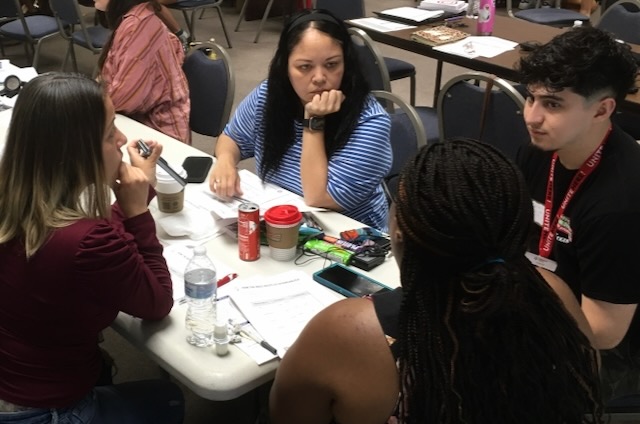by Christian P
If you’re new to the DSA or democratic socialism in general, you may wonder why we have such an affinity for the labor movement, why we focus so much attention on building power in our unions through rank-and-file strategies. You may be familiar with or even engaged in other types of movements: Black Lives Matter; LGBTQ rights; or protests in defense of immigrants.
The labor movement holds central importance to us because of both the injustice workers suffer and the power held by workers when they organize: the workplace is the fundamental location of capitalist exploitation. While many see power in the world being exclusively expressed in politics and elections, we recognize that the ultimate source of power is economic. Through every workplace, workers build the world, we keep it running. But in these workplaces, where we spend the majority of our days, we are subject to conditions and wages set by a few elite owners and bosses. We have little or no say in most workplaces: they are anti-democratic and authoritarian in nature. Through unions, though, we can take a step towards bringing the economic part of our lives into democratic control.
In the interest of doing just so, early in the morning on Saturday, June 10th, over a hundred union organizers and activists from all over Texas and as far as Thibodeaux, LA and even California gathered into the top floor of the IBEW Local 520 union hall to attend a Secrets of a Successful Organizer workshop led by Labor Notes. Inside, we traded success stories, warnings of pitfalls, and techniques for joining together, fighting the boss, and winning the conditions, pay, and benefits that workers deserve. From the moment you entered the room, the bright friendly faces, lively conversation, and the busied pace with which people moved about the space to meet their fellow organizers told you that if you were the kind of person excited to fight for a better workplace, and even a better world, you were in the right place.

Over the course of the day, the event’s speakers reinforced key ideas about organizing and led us through practices designed to help us think about and plan how to organize in our workplace. This is the kind of training we all need if we are to enact truly transformative democratic change in our society. The brilliant veteran organizers covered a lot in eight hours, but there are a few key takeaways.
The Workplace is Already Organized
Probably the lesson reinforced the most at the event, the Labor Notes organizers encouraged us to think about the workplace in terms of its already existing connections. Your workplace may include many employees, or be spread across multiple locations, and when you’re putting together a campaign or a union drive, your time and resources are limited, with this activity being joined on top of your actual job. By understanding the connections that already exist, and by identifying natural leaders to bring into the organizing campaign, you can save yourself and your organizing committee lots of time and effort and help your chances of winning.
Your Workplace has Natural Leaders
Finding and working with natural leaders at your workplace was another key lesson of the workshop. Natural leaders is a term used to refer to people with influence at work, those who people will go to with a problem for help. Leaders are absolutely key to any organizing campaign, and the number of them you’ll need increases with the size and complexity of the workplace. The workplace may be divided into multiple shifts, locations, departments, or may contain language barriers. Understanding the terrain of your workplace may seem trivial, but an effective campaign must consider these obstacles to be successful. One of the many practices we went through at the workshop was literally mapping the workplace on a piece of paper – simple yet effective.
Apathy Doesn’t Exist
While this claim may seem to be in immediate contradiction with our lived experience in the demobilized, depoliticized world we live in today, the speakers at this event made a compelling case that apathy is a quality that we place onto others in our attempts to understand their actions (or lack thereof). This lesson in particular offers a powerful potential for hope. If people just don’t care, there is no point, there is perhaps no chance for us to win.
Despite how it may sometimes seem, the majority of people do care about society and its future, the lives and communities around them.

Instead of seeing apathy in those at the workplace, the educators argued that you can overcome demobilization at the personal level by breaking it into four categories: fear, hopelessness, division, and confusion. In overcoming fear, we tap into righteous anger about injustice in the workplace, so that co-workers may find the courage to act. In overcoming hopelessness, we help develop and demonstrate a plan to win, and share those victories in others to inspire hope that change is possible and worth fighting for. In conquering division, we must identify common ground and build relationships to find the unity to act together. And to address confusion, we must interpret and communicate to fit that confusion into a bigger picture to gain the clarity to see through the boss’ plan.
Your boss is the best organizer
The opening of the workshop featured interviews of a panel of new or active organizers. A common thread running through all their stories was that if you give the boss a chance to show what side they’re on, they can be the most effective organizer of all. With Hayes County EMS workers, this was the boss firing an employee after 19 years of service for a fake, non-issue: not trying hard enough on a workplace test that she herself had developed, but really for participating in organizing. For organizers from a Dallas newspaper, this was the boss taking away the employees’ insurance coverage when the employees decided to strike. They even cut the coverage of a coworker who had recently had a stroke and was in a narrow window of being able to attend physical therapy to relearn how to walk. In both these cases, the bosses’ actions showed the employees clearly the sides that exist, and where management’s real priorities lie.
In short, the workshop gave a great wealth of lessons. This sort of gathering is hugely valuable to the work we have ahead of us, it allows us to share knowledge across generations and across geography of how to effectively go about our transformative work. It inspires hope in seeing so many in the same room so passionate about making our workplaces and the world a better place. If the DSA is to be a vital part of organizing the working class against the capitalist class, we must demonstrate the value of this organizing knowledge, and we must help put it into the hands of every worker out there. As socialists, we believe that the working class must liberate itself from capitalism. Workshops like this hone the workers’ ability to do just that.

